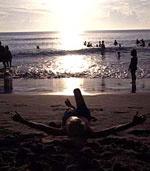HANOI, Vietnam — Al DeMatteis, Suel Jones and Trang Phan are all Americans, and they all have chosen to live in a country that was, just 30 years ago, America’s enemy.
Each has a different reason.
U.S. embassy officials estimate that there are between 4,500 and 4,700 American citizens living in Vietnam, about 4,000 of them living in Ho Chi Minh City, the former Saigon. For some, like DeMatteis, Vietnam is a business opportunity; for others, like Phan, it is a way of connecting with the past.
And for others, military veterans like Jones, it is the place full of bad memories to cast out, to be replaced with thoughts of peace.
“Once you get the fever to be overseas, it’s hard to get it out of your system,” says DeMatteis, 69, a native of Brooklyn who has lived in Vietnam for 12 years. “You’ll always have a yearning to go back overseas. I think it’s the nature of it, the excitement, the challenges… Vietnam is a challenge.”
DeMatteis’ company is now involved in several major projects, including a multimillion dollar resort in central Vietnam near the famed China Beach. His wife and six adult children still live in the United States and he visits them regularly.
“I feel like an outsider when I go home. My wife, my kids — they have their own lives. I go home and I hang out with the retirees. People ask me what the hell I’m doing here …
“I was a developer in New York when I saw an ad in Crain’s magazine about an American Chamber of Commerce in Vietnam. I thought to myself, I really want to see that country.
“I was part of the founding group for the American Chamber of Commerce. We have a July 4th celebration every year. We try and keep a bit of American life here.”
“Initially I came back because deep down, I wanted to connect with the Vietnam that my family talked about,” says Phan, 29, who moved to Vietnam from Santa Ana, Calif., three years ago as a Fulbright scholar working on public health issues. “I wanted to experience life that my mother had talked about. The Vietnamese part of me had a yearning to reconnect.
“I didn’t think anything negative about the U.S. But now that you’re exposed to life here, now I do. Life is so much more lively. Being in a developing country makes you feel optimism in the air. In the States, you’re so isolated. Yes, you have stable jobs, but things seem stagnant.
“When you’re here, travel is more accessible. I can fly to China or Nepal if I want. It’s not so easy from the States.
“For Viet kieu (as overseas Vietnamese are called), it’s also a chance to be away from your families. Not be so locked into family responsibilities. You get away from the pressures of family, pressure to have a house, have a car.
“In the U.S., there’s no balance in your life. It’s all about work, work, work and money, money, money. Here, you have a job you love, but you also have a life outside of that.”
“Sometimes I’ll meet North Vietnamese veterans here,” says Jones, 62, a Vietnam veteran from Glacier View, Alaska. “I’ll tell them where I was fighting and then realize we were shooting at each other. Next thing you know, we’re taking off our shirts and showing off our scars. Suddenly we’re like brothers.”
Jones fought with the 3rd Marines along the demilitarized zone in central Vietnam in 1968-69. In 1998, he started coming back to Vietnam for a few weeks at a time. He moved back for good three years ago, volunteering at the Vietnam Friendship Village, a semiprivate facility for children and others afflicted with Agent Orange-related diseases.
“I really wanted to give something back to Vietnam. I really like living here and I don’t care to live in the U.S. anymore. … I don’t like the political climate back there. This isn’t the America I grew up with. I thought America was compassionate and caring. I grew up with the concept that we were a righteous nation doing good things.
“I love Vietnam, I’m treated so nice here. I don’t feel any aggression or anger towards me. Living in the U.S., I think it’s gotten so negative, aggressive and unsafe. I couldn’t possibly walk the streets alone at night. Here I can walk around anytime. …
“I wanted to erase the negative images I had about Vietnam. In my head, it was images of war and tanks. By doing this, I’m replacing those images with different ones. Vietnam has really moved on and I realize that I hadn’t, that my country hadn’t moved on. We’re still fighting the war. …
“I talk to Vietnam veterans a lot. Everyone came here (during the war) with the concept of doing something good. I tell them we have an opportunity to do what we started out to do back then. I really feel like what we did in Vietnam was totally wrong. We owe this country a great deal.”
ATTENTION READERS
We See The World From All Sides and Want YOU To Be Fully InformedIn fact, intentional disinformation is a disgraceful scourge in media today. So to assuage any possible errant incorrect information posted herein, we strongly encourage you to seek corroboration from other non-VT sources before forming an educated opinion.
About VT - Policies & Disclosures - Comment Policy

 Americans return to Vietnam, but this time they have left behind their tanks
Americans return to Vietnam, but this time they have left behind their tanks

